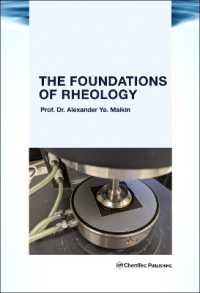Full Description
Despite developments in research and practice on using examinee response process data in assessment design, the use of such data in test validation is rare. Validation of Score Meaning in the Next Generation of Assessments Using Response Processes highlights the importance of validity evidence based on response processes and provides guidance to measurement researchers and practitioners in creating and using such evidence as a regular part of the assessment validation process. Response processes refer to approaches and behaviors of examinees when they interpret assessment situations and formulate and generate solutions as revealed through verbalizations, eye movements, response times, or computer clicks. Such response process data can provide information about the extent to which items and tasks engage examinees in the intended ways.
With contributions from the top researchers in the field of assessment, this volume includes chapters that focus on methodological issues and on applications across multiple contexts of assessment interpretation and use. In Part I of this book, contributors discuss the framing of validity as an evidence-based argument for the interpretation of the meaning of test scores, the specifics of different methods of response process data collection and analysis, and the use of response process data relative to issues of validation as highlighted in the joint standards on testing. In Part II, chapter authors offer examples that illustrate the use of response process data in assessment validation. These cases are provided specifically to address issues related to the analysis and interpretation of performance on assessments of complex cognition, assessments designed to inform classroom learning and instruction, and assessments intended for students with varying cultural and linguistic backgrounds.
The Open Access version of this book, available at http://www.taylorfrancis.com, has been made available under a Creative Commons Attribution-Non Commercial-No Derivatives 4.0 license.
Contents
Contents
Contributors
1. Introduction
Kadriye Ercikan and James W. Pellegrino
Part I. Conceptual & Methodological Issues Associated with Using Examinee Response Process Data to Validate Score Meaning
2. Validating Score Interpretations Based on Response Processes
Michael Kane & Robert Mislevy
3. Collecting and Analyzing Verbal Response Process Data in the Service of Interpretative and Validity Arguments
Jacqueline P. Leighton
4. Collecting, Analyzing and Interpreting Response time, Eye-tracking, and Log data
Andreas Oranje, Joanna Gorin, Yue Jia, Deirdre Kerr
5. Commentary I
Lauress L. Wise
Part II. Using Examinee Response Process Data to Validate Score Meaning: Applications in Different Assessment Contexts
6. Assessments of Complex Thinking
Paul Nichols and Kristen Huff
7. Threats to Score Meaning in Automated Scoring
Isaac I. Bejar
8. The Contribution of Student Response Processes to Validity Analyses for Instructionally Supportive Assessments
Louis V. DiBello, James W. Pellegrino, Brian D. Gane, & Susan R. Goldman
9. Score Processes in Assessing Academic Content of Non-native Speakers
Rebecca J. Kopriva and Laura Wright
10. Assessment of Students with Learning Disabilities: Using Students' Performance and Progress to Inform Instruction
Gerald Tindal, Julie Alonzo, Leilani Sáez, and Joseph F. T. Nese
11. Multiple Language Versions of Tests
Guillermo Solano-Flores and Magda Chía
12. Commentary 2: The Value of Response Process Studies to Evaluate Score Meaning
Suzanne Lane
Index








